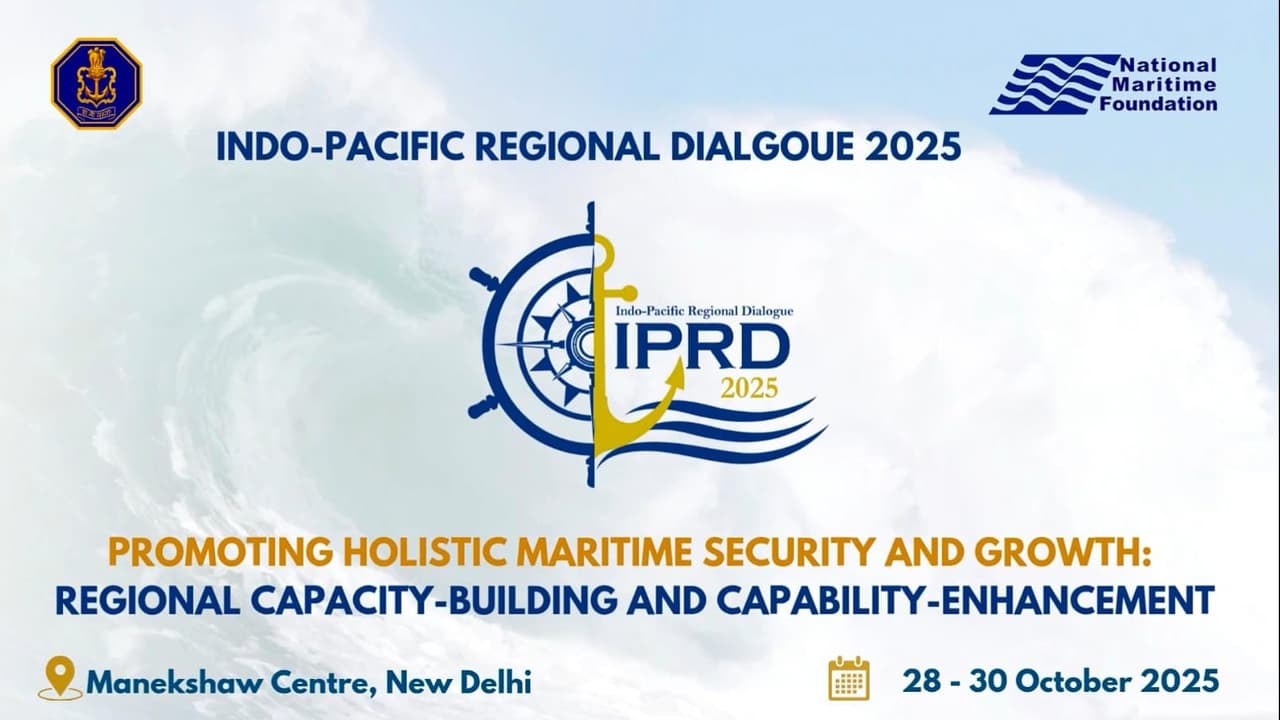Indian Navy will host the Indo-Pacific Regional Dialogue from October 28-30 at Manekshaw Centre under the theme ‘Promoting Holistic Maritime Security and Growth’. The event will focus on strengthening regional capacity, capability and cooperation.
New Delhi: The Indian Navy will be hosting the Indo-Pacific Regional Dialogue (IPRD) 2025 from October 28 to 30 at the Manekshaw Centre, New Delhi, in collaboration with the National Maritime Foundation (NMF). IPRD is the Navy’s annual, apex-level international conference on maritime strategy, diplomacy, and regional cooperation.
The IPRD 2025 edition will be held under the theme “Promoting Holistic Maritime Security and Growth: Regional Capacity-Building and Capability-Enhancement,” highlighting India’s focus on strengthening regional maritime mechanisms through both material resources and human expertise.
Linking Policy to Practice
Launched as a strategic outreach platform, IPRD serves as the principal manifestation of the Indian Navy’s strategic engagement efforts and builds directly upon the Indo-Pacific Oceans Initiative (IPOI) introduced by Prime Minister Narendra Modi at the 14th East Asia Summit in Bangkok in 2019.
Over the years, the IPOI has evolved into a collaborative framework with several countries volunteering to lead on specific “lines of thrust” – including maritime security, connectivity, sustainable resource management, and disaster risk reduction.
The Indian Navy positions IPRD as a mechanism for providing second- and third-order specificity to India’s maritime policy framework, MAHASAGAR, short for “Mutual and Holistic Advancement for Security and Growth Across Regions.”
This framework sees the Indo-Pacific as an interconnected strategic geography – extending from Africa’s eastern coast to the Americas’ western seaboard, and from South Asia to Antarctica – rather than a single geopolitical strategy.
Structured Maritime Cooperation
According to the official concept note, any effective model for holistic maritime security must operate across three interlinked layers:
A conceptual layer, guided by MAHASAGAR’s principles of inclusive growth;
A political layer, connecting regional institutions such as the Indian Ocean Rim Association (IORA) and the East Asia Summit (EAS); and an executive layer, involving maritime forces and agencies under collaborative platforms like the Indian Ocean Naval Symposium (IONS) and the Western Pacific Naval Symposium (WPNS).
With the Indian Navy once again assuming the chairmanship of IONS, IPRD 2025 is expected to give further momentum to these efforts and accelerate practical maritime coordination across regions.
Capacity, Capability, and Climate
This year’s agenda brings a dual focus: enhancing capacity – the physical and technological resources that enable maritime operations – and improving capability, the organizational and human competencies that sustain them.
Sessions will address a range of operational and policy issues, from port and undersea infrastructure security to climate adaptation, blue economy innovation, and maritime disaster preparedness. The aim is to ensure that economic growth and maritime stability reinforce one another.
India’s Expanding Maritime Role
Currently, the Indo-Pacific faces overlapping challenges, like competition over sea lanes, environmental stress, and shifting supply chains.
Against this backdrop, IPRD 2025 reaffirms India’s position as a responsible maritime stakeholder and net security provider committed to advancing collective growth and resilience in the region.
Describing it Dialogue as a step beyond conversation, the Indian Navy said it is a platform for designing solutions that translate into action at national, sub-regional, and pan-regional levels.
